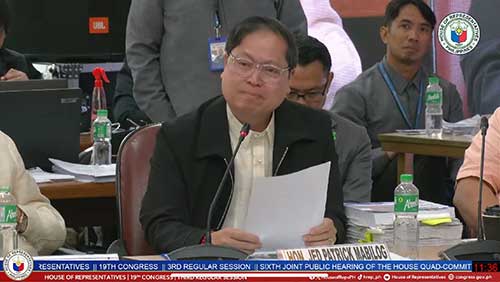
By Joseph Bernard A. Marzan
Former Iloilo City Mayor Jed Patrick Mabilog said politics was behind former President Rodrigo Duterte’s accusations linking him to the illegal drug trade, which forced him into self-exile and ultimately led to his political asylum abroad.
Speaking before a joint hearing of the House of Representatives’ ‘Quad’ committee on Sept. 19, Mabilog addressed the allegations made by Duterte, which first surfaced during his presidency in 2017.
Mabilog testified at the hearing organized by the committees on Dangerous Drugs, Public Order and Safety, Human Rights, and Public Accounts, following a request by Public Accounts Committee Chair Rep. Joseph Stephen Paduano (Abang Lingkod Party-list).
“I learned that there were intentions to have me speak as a resource person before the Quad committee’s hearing. When I learned of it, I thought this might be the perfect opportunity to finally tell the truth, even though I am scared and there are threats against my life,” Mabilog said in Filipino in his statement.
“First of all, I declare that I was not, and never will be, a drug protector. I don’t know, nor have I benefited in any way, from any illegal drug personality in Iloilo or elsewhere. After seven years of exile, due to politicized and baseless accusations, and threats to my family’s life, I am here facing you,” he added in a mix of Filipino and English.
Mabilog recounted the events leading to his exile, which began with Duterte’s repeated inclusion of his name on a “narco list” of public officials allegedly involved in the drug trade.
Duterte had repeatedly referred to Mabilog in 2017 and 2018, even calling Iloilo City “the most shabulized.”
Despite denials from then-Philippine Drug Enforcement Agency (PDEA) Western Visayas Regional Director Gil Pabilona and then-Iloilo City Police Chief Remus Canieso, who confirmed that Mabilog wasn’t on their own lists, the former mayor’s name remained in Duterte’s.
“Until today, there are no drug-related cases filed against me in any legal courts. But if you look carefully, names of political opponents were included in subsequent ‘PRRD lists,’ despite questionable information and no validation or confirmation from any agency,” Mabilog said, referring to Duterte by his initials.
He also recalled instructions and conversations with officials of the Philippine National Police (PNP), explicitly naming then-regional director Bernardo Diaz and former PNP chief and now-Senator Ronald dela Rosa.
The former mayor was told to go to dela Rosa at the PNP headquarters in Camp Crame to discuss his case.
But Mabilog disclosed that a police colonel warned him not to go to Camp Crame, saying his life was in danger.
“At around 5:00 p.m. [on August 29, 2017], a PNP colonel called me in a voice that sent shivers down my spine, warned me not to go to Camp Crame. The fear that had been simmering had now erupted. Soon after, at 6:32 pm, my wife Marivic received a chilling text from a PNP colonel’s wife: ‘Do not proceed. There are 20 men surrounding your house. If you go to Camp Crame, they will kill you.’ The terror was paralyzing. I couldn’t believe it. My life and my family’s life was hanging by a thread,” he said.
At that time he was in Japan for a speaking engagement.
Mabilog revealed that he had spoken to then-PNP Chief and now-Senator Ronald dela Rosa from a payphone in Japan, where dela Rosa assured him of his support.
“[Dela Rosa’s] words brought a brief moment of hope. I told him I would finish my work abroad, but he urged me to be careful, repeating his pledge to help,” he expressed.
However, this brief moment of hope quickly dissipated when another police official instructed him to implicate two opposition figures – “an opposition senator” and “a former presidential candidate” – as “drug lords.”
This conversation ultimately led him to flee instead of returning to the Philippines. His family later followed him.
Had he capitulated to the Duterte administration and kept alive, Mabilog said he would have been forced to link two personalities to the illegal drug trade: former senators Franklin Drilon and Mar Roxas, both of whom he supported during the 2016 elections as a member of the Liberal Party.
He also cited an incident then-candidate Duterte blamed him for the power going out during a campaign rally in the city.
“Just after that call, my Philippine cellphone rang. This time, it was another [police] general. His voice was grim, ‘Mayor, do not return. Your life is in danger. The accusations against you are all fabricated[,]’,” he recalled.
Tearing up during his testimony, Mabilog expressed hope that no one else would suffer the same persecution he experienced.
“I hope that the hardship we mayors endured — being crushed, persecuted, and traumatized — will not happen to anyone else, and that the truth, not political agendas, will prevail,” he said tearfully, ending his speech with his well-known phrase, “I am Iloilo, proud to be Filipino.”
Mabilog first expressed his intention to clear his name during a Sept. 10 interview with Karen Davila on ABS-CBN News Channel, the same day he returned to Manila after seven years in exile.
He and his family were granted political asylum in the United States in March 2019, following an investigation by U.S. authorities into the drug allegations against him.
In 2017, the Office of the Ombudsman dismissed Mabilog from service on a charge of serious dishonesty related to an unexplained increase in his net worth. But the Court of Appeals dismissed the case upon Mabilog’s appeal.





















